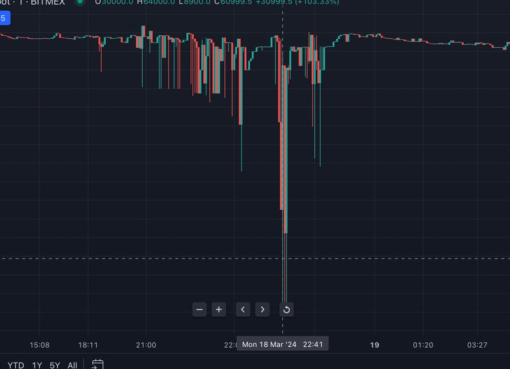This week, crypto markets were in turmoil. Justin Sun’s HTX and Mixin Network fell victim to hacks. Binance left Russia while MicroStrategy augmented its BTC stash.
A flurry of hacks and scams
The crypto scene witnessed a slew of security breaches and developments around scams throughout this week. Crypto exchange Upbit encountered a challenge involving counterfeit tokens amounting to $3.4 billion in trades.
The prominent South Korean platform witnessed the proliferation of counterfeit tokens masquerading as Aptos (APT) tokens. These tokens, identified as ‘ClaimAPTGift’ coins, attempted to infiltrate the exchange, causing a disruption.
In response to the growing number of crypto-related scams, Chase U.K. opted this week to take a precautionary stance by prohibiting all cryptocurrency payments.
Commencing on Oct. 16, they will implement a categorical restriction on any transactions related to cryptocurrencies. Evidently, Chase U.K. has reservations regarding the cryptocurrency ecosystem, primarily due to concerns surrounding fraudulent activities.
HTX suffers $8 million hack
HTX (formerly Huobi) experienced an unwelcome intrusion by hackers, resulting in the theft of 500 Ether (ETH) with an approximate value of $8 million. In response, HTX assumed responsibility for compensating their affected clientele.
Justin Sun, HTX’s advisory board member, noted that the funds represent a small portion of the exchange’s $3 billion reserves. He confirmed that HTX has offered a substantial 5% reward, worth $400,000, to the hackers if they are willing to return the stolen assets.
Following the regrettable $8 million security breach, Sun took the initiative to introduce a safeguard mechanism known as the SAFU fund. The fund functions as a protective buffer, poised to mitigate potential security challenges that may arise in the future.
Mixin exploited for $200 million
Mixin Network, a prominent player in the blockchain scene, boasting connectivity to 48 networks, temporarily suspended its deposit and withdrawal services in the wake of a significant $200 million breach. A hacker infiltrated the database of their cloud service provider, leading to the theft.
Mixin Network adopted a vigilant stance, putting a temporary halt on deposits and withdrawals while ensuring that the internal crypto transactions within their network continue unabated.
Binance officially leaves Russia
Crypto exchange Binance exited Russia. CommEX is set to take over the local business. This transition will span over a year, ensuring a gradual exit. Binance assured that Russian users’ funds remain secure. Noah Perlman, Binance’s Chief Compliance Officer, attributed this move to regulatory challenges.
Afterward, CommEX dispelled rumors surrounding their acquisition of Binance’s Russian business. They emphasized that Binance does not own them, even though they have former Binance employees on their team. Despite this rebuttal, they kept the identities of their execs confidential.
MicroStrategy augments BTC stash
Michael Saylor’s MicroStrategy continued its vigorous Bitcoin acquisition strategy. From Aug. 1 to Sept. 24, they acquired 5,445 BTC, amounting to a $147.3 million investment.
As a result, its balance sheet now boasts an impressive $4.6 billion worth of Bitcoin. Recall that this BTC strategy commenced in 2020, driven by a desire to diminish cash holdings and safeguard against inflation.
Russia looks to blockchain
Speaking at the Moscow Financial Forum, Russian Prime Minister Mikhail Mishustin said that the Russian government, alongside the Bank of Russia, is developing a blockchain-based system for international settlements using digital financial assets.
His statement comes just a few months after he visited China for a two-day trip, during which he highlighted the increasing trade and investment connections between the two nations. Since 2022, the U.S. and European Union imposed strict economic sanctions on Russia due to the war in Ukraine.
Global regulatory and enforcement actions
U.S. Representative Don Beyer unveiled a legislative effort in the form of the Off-Chain Digital Commodity Transaction Reporting Act.
Under the bill, trading platforms will divulge transaction data to a designated repository, officially registered with the Commodity Futures Trading Commission (CFTC). The aim of the bill is to protect investors against fraud and manipulation.
Meanwhile, Hong Kong is taking action in response to the JPEX crypto exchange issue, categorizing it as a substantial matter of concern. In the latest development, authorities arrested twelve individuals involved and seized assets valued at HK$85 million (US$10.8 million).
Drama surrounding crypto ETFs and the SEC
Notably, the U.S. SEC also came into the spotlight, particularly with regard to developments around ETFs. The SEC postponed the decision on the ARK 21Shares Bitcoin ETF until January 2024, making it clear they’re not in a rush when it comes to crypto ETFs despite Congress’ demand for a swift decision.
However, in a subsequent report, Bloomberg analysts suggested the SEC could approve an Ethereum futures ETF as early as next week, strategically timing it just before a potential U.S. Government shutdown.
As a result, filers are advised to ensure document updates are completed by Friday, with trading potentially commencing next Tuesday.
The agency postponed spot BTC ETF applications from various firms, per reports on Sept. 28. They’re now embarking on further procedures to weigh the options. They’ve allotted 21 days for public comments, followed by a 35-day period for responses.
Congress grills Gensler
Amid his consistent crackdown on the crypto industry, SEC Chair Gary Gensler faced intense scrutiny from policymakers this week for withholding documents related to the FTX situation. In addition, Gensler’s ambiguous stance still kept Bitcoin’s regulatory identity a mystery.
Gensler maintained that crypto entities must adhere to regulations they’ve been skirting.
His prior association with Goldman Sachs also drew attention, with some questioning his Wall Street connections. Congress also highlighted the developments surrounding the delay in spot BTC ETFs.
Authorities arrest Su Zhu
In a surprising development, Su Zhu, co-founder of the now-defunct Three Arrows Capital (3AC) hedge fund, faced an unexpected detention this week. While it was widely assumed that Zhu was residing in Dubai, he was apprehended at a Singaporean airport.
The Singaporean court has imposed a four-month sentence and extended this sentence to 3AC co-founder Kyle Davies despite his being unaccounted for at present.
Court denies Bankman-Fried’s bid for pre-trial release
Speaking of past implosions, Sam Bankman-Fried’s legal team again sought his temporary release from jail to facilitate legal preparations for the upcoming trial. They argued that his insights are crucial for their defense and requested his release on Oct. 2, just before the trial commences.
However, this latest bid for pre-trial release was denied. The New York court stated that his lawyers did not provide enough reasons for his release. Judge Kaplan took the prosecutor’s side, noting that he had already received considerations uncommon for individuals facing federal charges.




